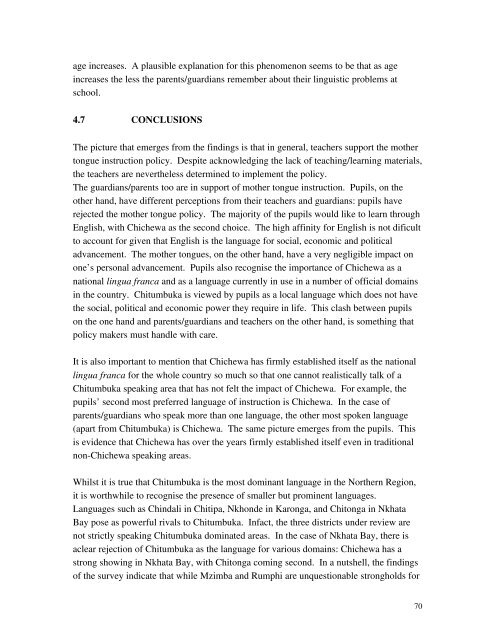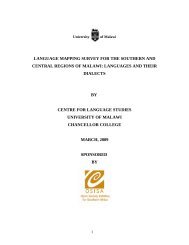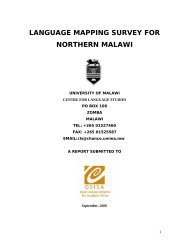SOCIOLOLINGUISTIC SURVEYS - Centre for Language Studies
SOCIOLOLINGUISTIC SURVEYS - Centre for Language Studies
SOCIOLOLINGUISTIC SURVEYS - Centre for Language Studies
You also want an ePaper? Increase the reach of your titles
YUMPU automatically turns print PDFs into web optimized ePapers that Google loves.
age increases. A plausible explanation <strong>for</strong> this phenomenon seems to be that as age<br />
increases the less the parents/guardians remember about their linguistic problems at<br />
school.<br />
4.7 CONCLUSIONS<br />
The picture that emerges from the findings is that in general, teachers support the mother<br />
tongue instruction policy. Despite acknowledging the lack of teaching/learning materials,<br />
the teachers are nevertheless determined to implement the policy.<br />
The guardians/parents too are in support of mother tongue instruction. Pupils, on the<br />
other hand, have different perceptions from their teachers and guardians: pupils have<br />
rejected the mother tongue policy. The majority of the pupils would like to learn through<br />
English, with Chichewa as the second choice. The high affinity <strong>for</strong> English is not dificult<br />
to account <strong>for</strong> given that English is the language <strong>for</strong> social, economic and political<br />
advancement. The mother tongues, on the other hand, have a very negligible impact on<br />
one’s personal advancement. Pupils also recognise the importance of Chichewa as a<br />
national lingua franca and as a language currently in use in a number of official domains<br />
in the country. Chitumbuka is viewed by pupils as a local language which does not have<br />
the social, political and economic power they require in life. This clash between pupils<br />
on the one hand and parents/guardians and teachers on the other hand, is something that<br />
policy makers must handle with care.<br />
It is also important to mention that Chichewa has firmly established itself as the national<br />
lingua franca <strong>for</strong> the whole country so much so that one cannot realistically talk of a<br />
Chitumbuka speaking area that has not felt the impact of Chichewa. For example, the<br />
pupils’ second most preferred language of instruction is Chichewa. In the case of<br />
parents/guardians who speak more than one language, the other most spoken language<br />
(apart from Chitumbuka) is Chichewa. The same picture emerges from the pupils. This<br />
is evidence that Chichewa has over the years firmly established itself even in traditional<br />
nonChichewa speaking areas.<br />
Whilst it is true that Chitumbuka is the most dominant language in the Northern Region,<br />
it is worthwhile to recognise the presence of smaller but prominent languages.<br />
<strong>Language</strong>s such as Chindali in Chitipa, Nkhonde in Karonga, and Chitonga in Nkhata<br />
Bay pose as powerful rivals to Chitumbuka. Infact, the three districts under review are<br />
not strictly speaking Chitumbuka dominated areas. In the case of Nkhata Bay, there is<br />
aclear rejection of Chitumbuka as the language <strong>for</strong> various domains: Chichewa has a<br />
strong showing in Nkhata Bay, with Chitonga coming second. In a nutshell, the findings<br />
of the survey indicate that while Mzimba and Rumphi are unquestionable strongholds <strong>for</strong><br />
70





